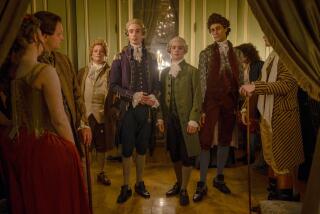Strong, silent types
John Barrymore and John Gilbert were the Johnny Depp and Brad Pitt of the silent era. Astonishingly handsome, charismatic and athletic, they possessed that undefinable “it” quality that turns performers into superstars on the big screen.
They also gave the 1920s’ other top male stars, Rudolph Valentino and Douglas Fairbanks, a run for their money at the box office more than 80 years ago.
Barrymore -- Drew’s grandfather -- made a successful transition to sound and starred in such high-profile films as “Grand Hotel” and “Twentieth Century,” until alcoholism and hard living destroyed him. His performances became more mannered, often descending into self-parody, and he had to have cue cards with his lines written out. He died at 60.
Gilbert’s sound career was allegedly sabotaged by MGM studio head Louis B. Mayer. Gilbert had attacked Mayer after the studio chief had made a crude remark about his lover Greta Garbo.
Supposedly, Mayer had the treble altered on the soundtrack of Gilbert’s first talkie, 1929’s “His Glorious Night,” so his speaking voice sounded reed-thin. Though he got some decent roles such as “Queen Christina” opposite Garbo, Gilbert’s career never recovered. An alcoholic, he was only 36 when he died.
Unfortunately, very few of their silent films have been released on DVD -- until now.
Thanks to Flicker Alley, two supposedly lost Gilbert films, “Monte Cristo” and “Bardelys the Magnificent,” have been restored and set for release Tuesday. Also set for that day is Kino’s four-disc “John Barrymore Collection,” which features “Dr. Jekyll and Mr. Hyde,” the horror film that turned him into a film star in 1920, plus “Sherlock Holmes,” “The Beloved Rogue” and “Tempest.” And Warner Archive unveiled Barrymore’s “Beau Brummel” and “When a Man Loves” last month.
Gilbert, born John Cecil Pringle in 1899, made his way to Hollywood as a teenager where he first became an extra for Thomas Ince Studios. By 1921, he was a full-fledged star and signed with Fox Film Corp.
One of his strongest Fox vehicles was 1922’s “Monte Cristo,” based on the Alexandre Dumas classic.
Though only 23 at the time, Gilbert gives a full-bodied turn as the young sailor Edmond Dantes, who is unjustly imprisoned for many years for a crime he didn’t commit. Studio head William Fox usually churned out films cheaply and quickly, but in the case of “Monte Cristo,” he spared no expense on sets and costumes.
The film was reissued in 1927, but withdrawn from circulation in 1928 due to a dispute with a European producer. Over the years, the negative disappeared and all prints were considered lost. However, a worn and choppy print was found in the Czech Republic and reconstructed from the original script.
Even more fun is “Bardelys the Magnificent,” a dazzling 1926 MGM swashbuckler that reunited Gilbert with “The Big Parade” director King Vidor. Gilbert is at his rakish, romantic best as the Lothario, Marquis de Bardelys.
Considered lost for 70 years, a print turned up three years ago in France. Because it is incomplete, stills and footage from the original trailer fill in the blanks.
Barrymore, born in 1882, hailed from a family of known actors -- older siblings Ethel and Lionel were also major stage and screen stars. His Broadway appearances in Shakespeare’s “Richard III” and “Hamlet” in the ‘20s were legendary. Barrymore began his film career around 1913.
He starred in the 1922 version of “Sherlock Holmes,” and gives a quiet, humanistic portrayal of Sir Arthur Conan Doyle’s super sleuth. Restored by the George Eastman House Motion Picture Department, the film also marks the debuts of Roland Young (“Topper”) as Dr. Watson and William Powell (“The Thin Man”).
Barrymore excelled at period pieces and swashbucklers and the Kino and Warner Archive releases feature four of his best, most notably 1924’s “Beau Brummel” and 1927’s “The Beloved Rogue.”
Warner Bros. spared no expense with the sumptuous “Beau Brummel.” Barrymore gives a nakedly emotional turn as a commoner who loses the love of his life (played by Mary Astor) to a richer man. He transforms himself into a social-climbing dandy in order to gain admittance to the royal court, but a misstep causes him to end his days in poverty and disgrace. Get your hankies out for the final reel in which Barrymore delivers a master class in film acting.
Barrymore is also perfectly cast in 1927’s swashbuckler “Beloved Rogue,” in which he plays the renowned French poet, thief and lover Francois Villon.
There are plenty of Fairbanks-esque stunts and fight sequences, oh-so-romantic moments and one amazing scene in which Barrymore, dressed in clown makeup for a carnival, learns he’s been banished from Paris. He slowly erupts into tears as he realizes he must leave his beloved city.
-- Elsewhere
Universal Home Video releases some great vintage flicks Tuesday including the underrated 1962 western “Lonely Are the Brave,” starring Kirk Douglas as a solitary cowboy who tragically collides with the modern world; and the campy 1944 fantasy adventure “Ali Baba and the Forty Thieves,” starring Maria Montez and Jon Hall.
--
More to Read
Only good movies
Get the Indie Focus newsletter, Mark Olsen's weekly guide to the world of cinema.
You may occasionally receive promotional content from the Los Angeles Times.











